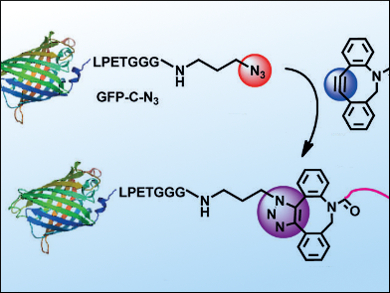The effective synthesis and delivery of polymer conjugates of protein and peptide therapeutics are challenges in clinical development. Conventional methods involve the reaction of polymers which have one reactive end with the reactive residues of proteins/peptides. This often limits control of the site and the grafting ratio, and can result in heterogeneous conjugates with poorly controlled stoichiometry and unacceptably low biological activity.
Ashutosh Chilkoti and colleagues, Duke University, Durham, NC, USA, developed a high-yield synthesis of site-specific protein/peptide-polymer therapeutics by using a modular approach involving recombinant expression, enzymatic attachment of an azido group to the protein/peptide, and polymer coupling by a copper-free click reaction (pictured).
The researchers demonstrated the concept with green fluorescent protein and exendin-4, a peptide drug for treatment of type 2 diabetes, and several polymers including biodegradable polycarbonates and polyphosphoesters, zwitterionic polymers, and linear poly(ethylene glycol) (PEG). The study showed significantly improved pharmacokinetics and improved therapeutic effects in mice.
The only requirement for this method is that the protein or peptide must have a defined peptide sequence at its C-terminus, which is easily achieved by recombinant expression or by solid-phase synthesis. This makes it applicable to a large subset of protein/peptide drugs and to diverse water-soluble polymers. Therefore, the team hopes the work provides a general methodology for the clinical and commercial development of protein/peptide-polymer conjugates as biologic drugs.
- A Modular Method for the High-Yield Synthesis of Site-Specific Protein-Polymer Therapeutics,
Yan Pang, Jinyao Liu, Yizhi Qi, Xinghai Li, Ashutosh Chilkoti,
Angew. Chem. Int. Ed. 2016.
DOI: 10.1002/anie.201604661




